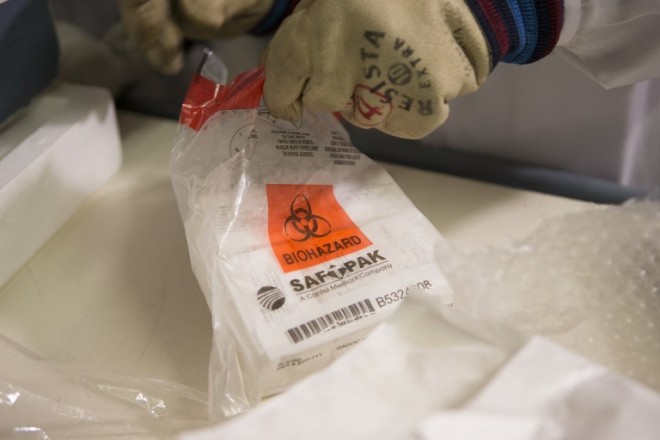
This handout photo released by the World Health Organization on October 22, 2014 shows reception by Geneva University Hospital (HUG) of a batch of experimental rVSV Ebola vaccine developed at the National Microbiology Laboratory in Winnipeg, Canada. Licenced by the Canadian government to US firm NewLink Genetics, rVSV is one of two experimental Ebola vaccines identified by the WHO as having shown promising results when tested on monkeys. Trials of the vaccine on humans are expected to begin at the end of the month or early in November. AFP
GENEVA — The number of people with Ebola is set to hit 10,000 in West Africa, the World Health Organization said, as the scramble to find a cure gathered pace.
The UN’s public health body said 9,936 people in Guinea, Liberia and Sierra Leone — the three countries at the epicentre of the world’s worst-ever Ebola epidemic — have contracted the disease. In total, 4,877 people have so far died.
With experts warning the rate of infections could reach 10,000 a week by early December, researchers around the world are scrambling to beat the tropical fever, for which there is currently no licensed treatment or vaccine.
The talks are expected to last two days.
Meanwhile doses of the experimental rVSV vaccine against Ebola arrived at the Geneva University Hospital from Canada.
The WHO is to coordinate trials of the vaccine in Geneva alongside those already under way in Germany, Gabon and Kenya.
The vaccine, developed at the National Microbiology Laboratory in Winnipeg, is one of two experimental Ebola vaccines identified by the WHO as having shown promising results when tested on monkeys.
WHO assistant director general Marie-Paule Kieny said the goal was to be able to ship initial supplies to Africa by early 2015, though mass vaccination campaigns are not yet on the cards.
“There is a very strong movement now from governments of many countries to push as quickly as possible these vaccines into real-world use,” she said.
A key aim is to help guard health workers against Ebola — some 240 have died so far as they strive to care for desperate patients.
At the same time, the American Institute of Health announced it they had begun a clinical trial of a vaccine trialling it on 39 people. However, even if successful, the vaccine would not be available until next year.
Also Wednesday US pharmaceutical giant Johnson & Johnson announced it would spend $200 million (157 million euros) to accelerate an Ebola vaccine program that is in development.
It plans tests on volunteers in January.
The Red Cross said it would be at least four months before the epidemic is contained, but only if all necessary steps are taken.
“It will be possible, as it was possible in the past, to contain this epidemic within four to six months” if the response is adequate, said Elhadj As Sy, chief of the International Federation of Red Cross and Red Crescent Societies (IFRC).
New US measures
The latest death toll was announced on the same day as the United States tightened up its screening process for people entering the country from Guinea, Liberia and Sierra Leone, announcing that travelers from the three countries would undergo “active monitoring” for signs of the virus for 21 days.
The system aims to “further protect Americans against Ebola” by monitoring travelers for the entirety of the virus’s incubation period, the US Centers for Disease Control and Prevention director Tom Frieden said.
The travelers will be asked to carry out daily self-checks for fever and provide contact details of friends or family in case follow-up is needed, he said.
The new measures came a day after the US Department of Homeland Security announced that all passengers from the affected region would have to fly into one of five airports that have additional screening measures in place.
At the same time, officials at Liberia’s international airport began using databases to match relatives against lists of Ebola patients, in order to stop any boarding, even if they showed no symptoms and were not contagious, Binyah Kessely, the Liberian Airport Authority chairman told AFP.
“We want to avoid being embarrassed whenever someone leaves Liberia to go to another country,” he said, referring to two Liberian citizens who carried the virus into Nigeria in July and the United States in September.
Riot
In Sierra Leone, two people died in a riot which erupted on Tuesday when health workers tried to take a blood sample from a 90-year-old woman suspected of having Ebola.
A machete-wielding mob clashed with security personnel in the eastern town of Koidu and then went on a rampage, doctors told AFP. Several buildings were attacked and gangs of youths roamed the streets shouting “No more Ebola!”
In neighboring Liberia, WHO found the number of cases had been underestimated, especially in the capital Monrovia.
But a member of the Doctors Without Borders team, working in the northern town of Foya told President Ellen Johnson Sirleaf, who was visiting, that the town could “soon be declared” Ebola free, after no new cases had been reported in three weeks.
Meanwhile, the latest contingent of 83 Cuban nurses and doctors headed to Liberia and Guinea on Wednesday bringing the total number of Cuban health workers in west Africa to at least 248.
In the US, a Texas nurse infected with Ebola after caring for a Liberian man who died from the disease no longer has the virus, her family said.
On Thursday, EU heads of government meet in Brussels and are expected to boost efforts in the fight against Ebola.
RELATED STORIES
World takes precautions vs deadly Ebola outbreak
There’ll be no stopping Ebola spread in PH, says expert